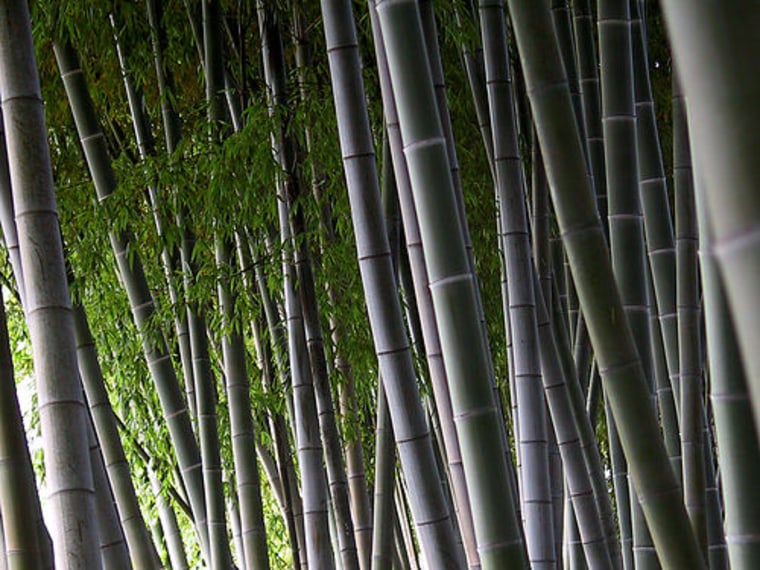Having trouble keeping up with our increasingly organic, eco-friendly world? Let me be your guide! From all-natural makeup to the best in eco-conscious jeans, I will test and review the products and treatments that are best for you and the planet.
What do you think about when you see the word “bamboo”? Until recently, whenever I came across the plant, perhaps tossed in a salad as shoots or sold in lucky sets of three in Chinatown, I’d picture giant pandas pigging out on their favorite snack.
But as I’ve learned more and more about environmentally friendly alternatives to everything from flooring, serving ware, furniture, and even clothes, I’ve come to see that bamboo plays a bigger role than merely panda sustenance.
Why bamboo? The short answer: As Americans become increasingly eco-conscious — or eco-curious for those just starting to look into the vast green options available today — one of the main issues that we look to eradicate is the uncontrolled use (um, exploitation) of the earth’s natural resources. Sure, most of these resources are renewable, that is, they naturally restock or renew themselves, but when our demand outpaces the rate at which the resource is able to be renewed, we run into serious trouble.
Enter bamboo, thought to be the fastest-growing plant on the planet. This grass — fun fact: Bamboo is classified as a grass, not a tree — has attracted the attention of eco-aware contractors and furniture designers because it is considered to be one of our most sustainable resources, while our forests risk devastating deforestation.
This grass is light-years away from the green tufts sprouting out of your front lawn. For starters, bamboo can be harvested in about four years — think how long it takes a tree to grow to full maturity — and, incredibly, does not require replanting because it continually creates new sprouts. And if that’s not enough, bamboo is so incredibly strong — certain varieties have been compared to steel — that it is used in the construction of homes and even bridges in some parts of the world. And bamboo is a natural superstar, growing to such heights—over 60 feet in some cases — without the aid of toxic pesticides and fertilizers.
Sounds pretty good, doesn’t it? Good enough to trade in your hardwood floors for bamboo’s blond boards or to look for dining tables made out of the king of all grasses. But what does bamboo, a resilient, hyper-strong plant, have to do with some of the softest, most luxurious clothing you’ll ever put on your body?

A lot.
Recent manufacturing technology has developed a method of turning bamboo pulp into fiber, which can then be transformed into silky-soft fabric. Designers both big and small are turning bamboo into sumptuous T-shirts, skirts, pants, socks, baby clothes, and even sheets and towels.
For the last year my bed has been swathed in the extra-soft goodness of bamboo sheets —like Egyptian cotton on steroids — and sleeping has yet to be the same (every night has been a cozier, cuddlier, all-around improved slumbering experience). In support of the mainstreaming of eco-conscious products I picked up my 230-count bamboo sheet set at Bed Bath & Beyond for an affordable $80 (queen-size).
To make bamboo clothing and home goods even more desirable, bamboo fabric has been found to be thermal regulating — keeps you cool in the summer and warm in the winter; moisture absorbing — bamboo fabric will absorb sweat quickly; breathable — clothing made out of bamboo is especially porous; and best of all, antibacterial — bamboo contains a naturally occurring antimicrobial agent called kun that prevents the growth of bacteria.
My top picks for the best of bamboo clothing design and home goods:
Bamboosa: This bamboo emporium is a one-stop shop for casual clothing for women, men and baby. The BamboosaBaby gift set makes an eco-original shower gift and Bamboosa’s socks would make an excellent stocking stuffer for the stinky-footed in your family. Bamboosa goes all the way with eco-friendly dyes and 100 percent recycled paper packaging as well as sweat-shop-free, U.S.-based manufacturing.
Linda Loudermilk: If eco-conscious clothing still conjures up images of bulky hemp pants in earthy, unflattering colors, it’s time to go luxury, “luxury eco.” Loudermilk is a high-end designer whose cutting-edge designs embody her “luxury eco” ethic with their colors and cut as well as their fabric origins. In addition to bamboo, the dynamic pieces are made of sasawashi, sea cell and other exotic sustainable plants.
Bamboo sheets: There are many options for outfitting your bed in bamboo. Gaiam sells sheet sets in a cotton-bamboo blend; VivaTerra’s sheets are made of 100 percent bamboo fiber; and Target has even gotten into the game with a 60 percent cotton, 40 percent bamboo blend.
Closing note: Bamboo fiber is undeniably soft, but it’s also undeniably imperfect. Eco-investigators are discovering that while the bamboo plant is environmentally friendly, the manufacturing process that turns bamboo into fabric may not be equally earth conscious. The minds behind the Organic Clothing Blog, a site that covers eco-fashion, believe that “the manufacturing of bamboo into fabric raises environmental and health concerns because of the strong chemical solvents used to cook the bamboo plant into a viscose solution that is then reconstructed into cellulose fiber for weaving into yarn for fabric.”
To play it safe, before you invest in your very own pair of bamboo pants or a set of bamboo sheets, take a moment to inquire into the company’s manufacturing methods.
Marisa Belger is a writer and editor with more than 10 years of experience covering health and wellness. She was a founding editor of Lime.com, a multiplatform media company specializing in health, wellness and sustainable living. Marisa also collaborated with Josh Dorfman on “The Lazy Environmentalist” (Stewart, Tabori, and Chang), a comprehensive guide to easy, stylish green living.